Who We Are
Amelia Caulfield, Sinead Cullen and Margaret Organ Creativity & Change accredited course participants.
What We Did
‘Butterflies for Bealtaine’ was an online action created by participants on the Creativity & Change course, 2020. The project was developed as a creative response to lockdown during the Covid-19 pandemic. It invited people to consider how a cocoon becomes a butterfly, creating art that expressed their hopes for the future of the world as we emerge from isolation and sharing it online using the hashtag #butterfliesforbealtaine.
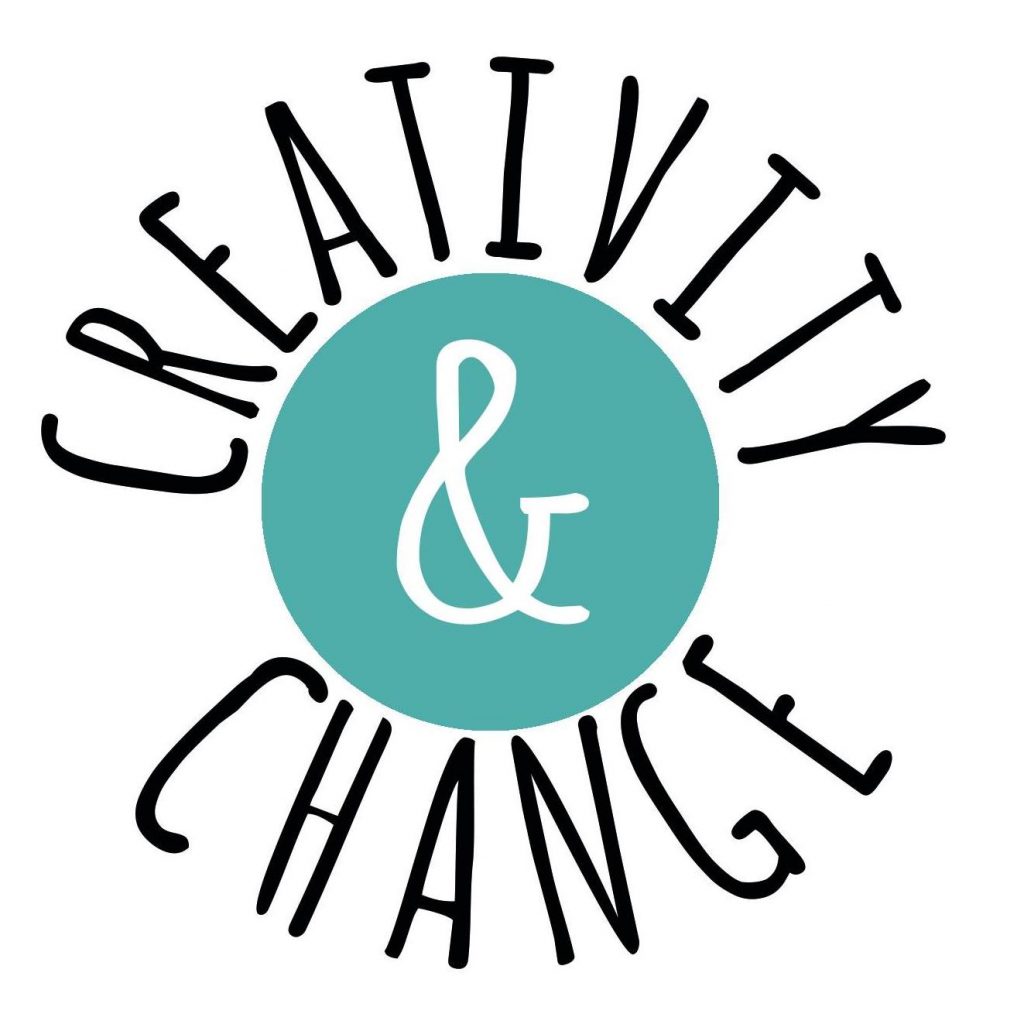
How We Did It
In Irish Celtic tradition, Bealtaine (May) signifies the beginning of summer and is a time of celebration and blessings. During the Covid pandemic, however, many people experienced isolation, sadness and despair due to the current global situation.
Amidst the challenges, we saw amazing changes and incredible acts of kindness; things that once seemed impossible have become possible, which has given us a basis to hope for resilient, interconnected communities going forward into the future.
For the month of May, the group invited the public to creatively respond to the theme of The Butterfly. Using the butterfly theme, they asked people to share a change they wished for on a personal, community or global level. People from across Ireland and beyond took part, creating their own mini-actions in their communities
We invited all ages to creatively respond to the theme of The Butterfly and to share a change they wish for on a personal, community or global level. In Ireland as in many parts of the world we have been in a quarantine situation because of the global pandemic. This environment informed our project.We asked:
- What positive changes that have happened in the last few weeks, inspire you to imagine more connected communities for all of us?
- How do you hope the future will be in our interconnected world after isolation?
We hoped that people would celebrate creativity and connection in our communities, inviting investigation that inspires hope for the future of our communities. We asked participants to consider things that inspired hope (head), to create something inspired by the ideas they considered (hand) and to connect with their hearts; with the feeling of what it would be to live in more connected communities (heart).
The principles and ethical considerations that were important to us included: Accessibility, inclusivity and ease of use across all ages and demographics.
The creative responses could be online and/or physical pieces of work that exist in the community. This is predominantly an online action and we felt it really important to make this project accessible for people who do not use social media or have on-line access. We wanted the possibility of creating physical pieces of art in the community
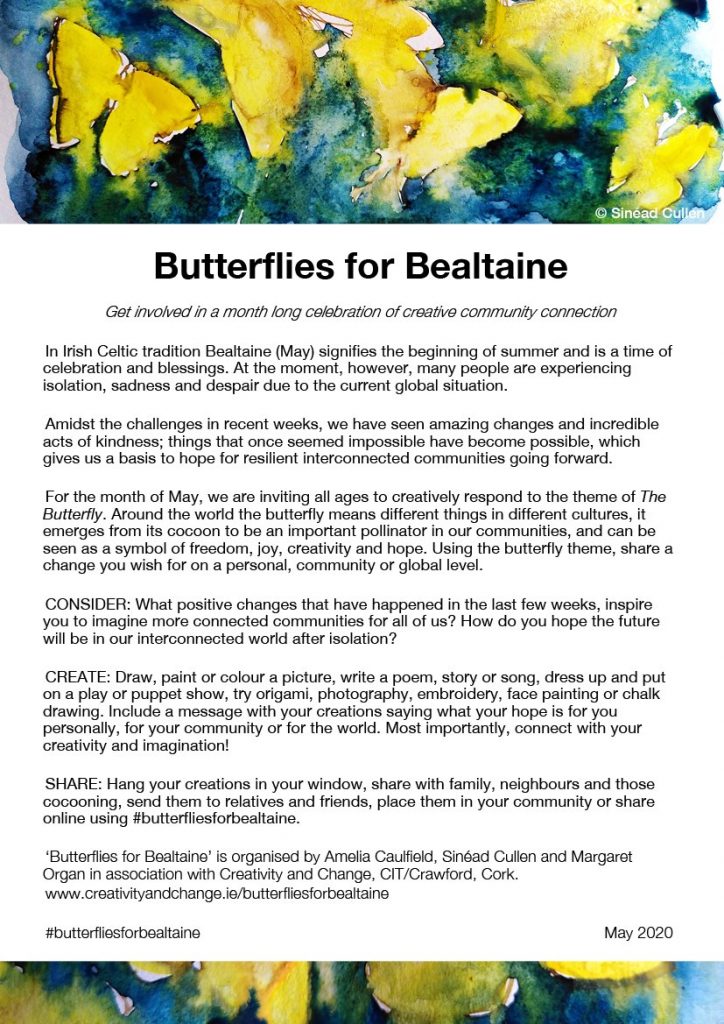
Tips!
Keep it simple. Keep it accessible. Keep it inclusive.
Consider allowing the action to run within a definite time frame.
Connect with a particular time of the year and its significance for the traditions and cultures of your country but not exclusive to it. Connect with other organisation in your communities with a remit for creativity e.g. arts offices, festivals, library services, intergenerational organisations, national arts organisations.
Don’t be too precious or anticipate outcomes, let the action happen organically. Leave space for inspiration, growth… possibilities. Don’t be too prescriptive, be open to any unexpected responses.
Did We Succeed?
During the month of May we saw:
- Beautiful creative responses to the theme.
- Engagement with the questions that we posed.
- Intergenerational activity: older people delighting in the invitation to be creative and young
- children embracing the creative idea of the butterfly.
- Videos showing others how to create butterflies (including fun tutorials on how to make your own).
- Positive feedback.
- People thinking outside the box because of the current limiting situation and limited access to materials.
The principles used in this awareness-raising activity could be taken into future actions by:
- Considering and including people who do not have online access.
- Bringing awareness to other people’s situations and creating empathy for others.
- Including input from communities through a consultation and engagement process.
- Remembering that an inclusive community action can be very simple and engaging.
“We created Butterflies for Bealtaine as a way to foster creative community connection across generations during quarantine. We wanted to address themes such as loneliness, isolation, the importance of human connection and creativity for well-being. We aimed to inspire participants to connect to themselves, to their family or cocooning relatives, to their communities and to the wider world.” – Amelia Caulfield
- This case study has been adapted from the Bank of Actions for Global Citizens produced by the Global Citizens Award. For more, visit the Creativity & Change blog.
Features, blogs and guides
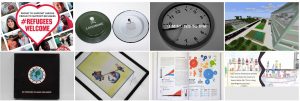
From Nicaragua to Ireland: Fairtrade Coffee and Global Solidarity
Fátima Ismael of Soppexcca, Cathal Murphy from Bewley’s and Fairtrade practitioner Kieran Durnien discuss 20 years of Fairtrade coffee solidarity linking Nicaragua and Ireland.
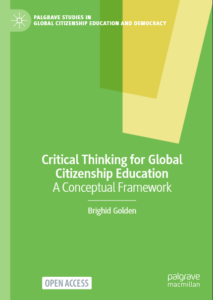
Critical Thinking for Global Citizenship Education
Join Brighid Golden for the launch of her latest book, ‘Critical Thinking for Global Citizenship Education: A Conceptual Framework’
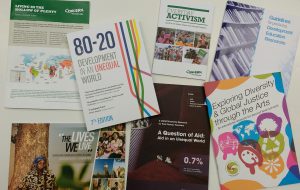
Your voice matters – 2026 user survey open
It’s January, its 2026, and we want to hear what you’d like us to feature or work on in 2026.
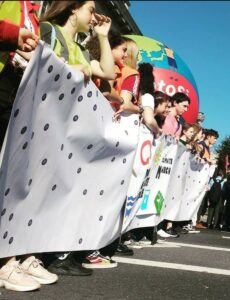
Calling Post Primary Teachers – Survey Participation Request
Your voice is vital in shaping the future of education for sustainable development in Ireland. Join a national survey for post primary teachers in October, led by DCU researcher Valerie Lewis

Webinar: Science for development on World Food Day
The webinar will feature YSTE projects, from Santa Sabina Dominican College (Dublin), Moate Community School (Westmeath) and CBS Thurles that focussed on nutrition and better food production, with Self Help Africa’s nutrition and gender specialist in Ethiopia, Sara Demissew.
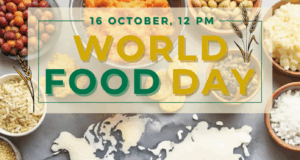
Student & teacher webinar: Food, hunger and SDG 2
Join the World Food Day webinar for post primary school students and teachers which will explore SDG 2: Zero Hunger.
